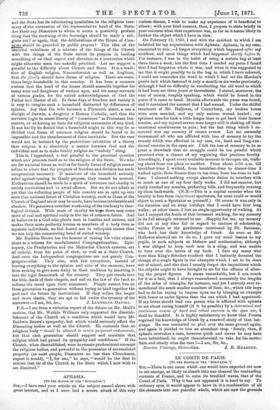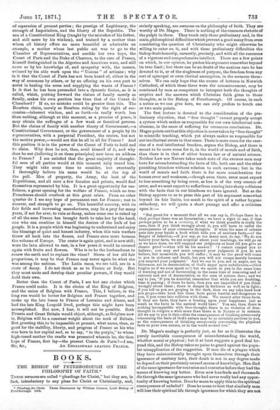LE COMTE DE PARIS.
[To THE EDITOR OF THE "SPECTATOR. 1.
Sue,—There is one name which One would have expected ere now to see emerge, as likely to absorb into one channel the contending currents of France, and to calm its troubled waves, that of the Count of Paris. Why it has not appeared it is hard to say. To ordinary eyes, it would appear to have in it a combination of all the elements into one peaceful whole, which are now the grounds
of separation of present parties ; the prestige of Legitimacy, the strength of Imperialism, and the liberty of the Republic. The
on of a Constitutional King (taught by the mistakes of his father, -and still more by his wisdom), and trained by a mother than whom all history offers no more beautiful or admirable an example, a mother whose last public act was to go to the Chamber of Representatives, and confide her two boys, the Count of Paris and the Duke of Chartres, to the care of France, himself distinguished in the Algerine and American wars, and still more so by his knowledge of, and sympathy with, the masses, evinced by his able work upon the " Unions " of artizans ; why (is it that the Count of Paris has not been heard of, either in the tiny of summons by others, or by an offering on his own part to Assist in healing the sores and supplying the wants of France ? Is it that he has been persuaded into a dynastic fusion, as it is called, which, putting forward the claims of family merely as family, makes his own position less than that of the Count de (Chambord ? If so, no mistake could be greater than this. The Bourbon claim, merely as Bourbon ruling by the right of suc- cession—inherent wisdom, and so forth—is really worth less than nothing, although at this moment, as a promise of peace, it may obtain the suffrages of a few weak or fanatical persons. But the claims of family with another theory of Government,—a Constitutional Government, or the government of a people by its representatives, with a perpetual President, the centre, but not the motive power,—would not this be all in all for France ? And this position it is in the power of the Count of Paris to hold and to claim. Why does he not, then, avail himself of it, and why -does he not (believing it on these principles) now issue an address to France ? I am satisfied that the great majority of thought- ful men of all parties would at this moment rally round him. They might take some time to consider, but eventually I thoroughly believe his name would be at the top of the poll. Men of property, the Army, the best of the Republicans, and all save a few fanatics and priests, would find themselves represented by him. It is a great opportunity for use- fulness, a great opening for the welfare of France, which no true Frenchman should overlook at this great crisis. From no other quarter do I see any hope of permanent rest for France ; rest to recover, and strength to go on. This beautiful country, with its fair fields and increasing manufactures, may lie a prey for many _years, if not for ever, to ruin or decay, unless some one is raised up of all the sons France has brought forth to take her by the hand, .one who can combine in himself the desires of the bulk of her people. It is a people which was beginning to understand and enjoy the blessings of quiet and honest industry, when this vain warfare threw all back into the flames, and France once more became .the volcano of Europe. The crater is again quiet, and is now still; were the lava allowed to rest, in a few years it would be covered Again with fruits and flowers. Who is to be the husbandman to renew the earth and to replant the vines? Shorn of her old fair ,proportions, it may be that France may never again be what she was among the nations. The Latin races, we are told, are in a state of decay. I do not think so as to France or Italy. But they must unite and develop their peculiar powers, if they would .hold their own.
Better than the Count of Paris, I see but one choice which France could make. It is the choice of the King of Belgium, and the union of Belgium with France. This, I believe, in the long run would be better for Belgium and France together, and make up the late losses to France of Lorraine and Alsace, and 'had the late King Leopold lived, perhaps this might have been accomplished. But now, I fear, it will not be possible. Both Prussia and Great Britain would object, although, as Belgium now is, Belgium will be a constant weight about the neck of Britain. But granting this to be impossible at present, what name, then, so good for the staliiiity, liberty, and progress of France as his who was born in her capital and, so to say, "in the purple," to whom high-toned mother the cradle was presented wherein he, the then hope of France, first lay—the present Comte de Paris ?—I am, &c., AN ENGLISHMAN LEAvING FRANCE.



































 Previous page
Previous page